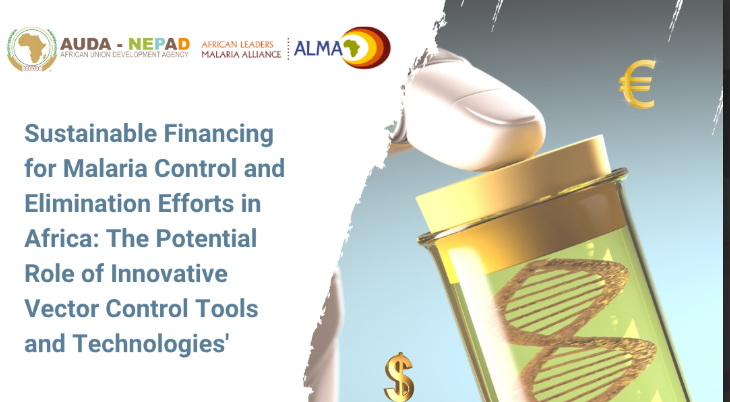
10 June 2025 | By Baboloki Semele: In a pivotal high-level webinar held today (10 June 2025) under the theme “Sustainable Financing for Malaria Control and Elimination Efforts in Africa: The Potential Role of Innovative Vector Control Tools and Technologies”, African leaders, health experts, and development partners came together to urgently address the continent’s deepening malaria burden and the growing financing gap threatening to derail hard-won public health gains. Speaking on behalf of the CEO of the African Union Development Agency (AUDA-NEPAD), Mr Symerre Grey Johnon, the Director of Human Capital and Institutional Development announced a renewed continental push toward innovation and sustainable health financing.
“Malaria is not merely a health challenge—it is a development challenge,” he said.
With Africa accounting for over 90% of global malaria cases and deaths, Grey Johnson emphasized the need for swift and transformative strategies to protect vulnerable populations, fortify overstretched health systems, and build financial resilience. The session highlighted how traditional donor support is becoming increasingly unpredictable, putting critical malaria intervention, including clinical research and vaccine development at risk. He warned that the urgency is needed, and needed very quickly, calling for integration of advanced tools such as gene drive technology and artificial intelligence to break malaria transmission cycles and reduce long-term reliance on repetitive interventions. AUDA-NEPAD, through its Africa Integrated Vector Control Program (IVP), is at the forefront of regulatory efforts to safely harness such innovations. The agency underscored its commitment to creating spaces for cross-sectoral learning and investment alignment, in partnership with organizations like the African Leaders Malaria Alliance (ALMA) and the CJED Knowledge Platform.
ALMA Executive Secretary Joy Phumaphi echoed these concerns and opportunities, stating, that the urgency to eliminate malaria intersects with a perfect storm of challenges; climate change, conflict, and widening financial gaps. Phumaphi revealed that the continent currently faces a $60 billion annual shortfall to meet its health-related Sustainable Development Goals (SDGs), with malaria programs particularly at risk due to donor aid reductions.Yet amidst these challenges, Phumaphi sees a turning point:
“This moment calls for a shift in mindset toward Africa-led, sustainable financing solutions.” She said
She lauded regional initiatives such as the Africa CDC Epidemic Fund and the emergence of country-level malaria councils, which have already mobilized over $150 million in domestic resources. Two additional councils were launched during this year’s World Malaria Day, signaling a groundswell of local ownership. Both Grey Johnson and Phumaphi stressed the need for governments to treat health as an integral pillar of development, calling for strong public health insurance systems, regulatory harmonization, local pharmaceutical manufacturing, and robust investment in research and development.
Phumaphi, emphasized the importance of tackling policy, technical, and financing bottlenecks, further highlighting that innovation is not just about creating tools but also about ensuring they reach those who need them most. The opening remarks by AUDA-NEPAD and ALMA echoed a call to a shared commitment to fostering multisectoral partnerships, aligning public and private sectors, and advancing regulatory pathways that enable the safe and rapid deployment of homegrown technologies. With a firm reminder of Africa’s past shortcomings under the Millennium Development Goals (MDGs), both speakers called for a new era of accountability under the SDGs, adding that AUDA-NEPAD and ALMA plan to continue convening such dialogues throughout the year, aiming to build momentum and political will for sustainable, innovation-driven malaria elimination across the African continent.